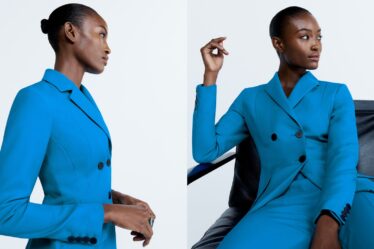PARIS – Would you wait in line for two hours for a $580 bag? For the growing fanbase of French direct-to-consumer label Polène, the answer is clearly oui.
Despite its location on a quiet square in Paris’ 2eme arrondissement (a step back from the city’s main shopping streets), a queue snakes around the boutique at all hours, rain or shine. To ease the wait, sales clerks serve hopeful customers tea and check if their desired bag is in stock — which is often not the case as the handbag startup struggles to keep up with surging growth.
Polène, which was founded by three siblings in 2016, has experienced “significant growth” in 2024 after growing sales to 142 million euros ($153 million) last year, Polène CEO and co-founder Antoine Mothay said in an interview at the brand’s Paris headquarters.
Now the brand has set up shop in London for the first time: inaugurating a two-story, 415 square-metre space near Piccadilly Circus on Monday.

A new, larger Paris flagship is also in the works. A sprawling 700 square-metre space on the iconic Champs-Elyseés shopping drag is set to fully open by late February, with part of the space opening up for holiday shoppers as early as this week. The new location could ease the lengthy queues — which Mothay calls “a nightmare,” preferable only to cluttered stores. “We want each sales person to attend to only three customers, and even that is a lot,” he said.
Next cities on the list are Munich, Miami and Dubai. “We’d like to open five to eight stores a year, to have a store in every big city,” said Mothay.
Alongside the likes of Sézane and Rouje, Polène is part of a wave of young French direct-to-consumer brands who have thrived in recent years as many of their American counterparts struggled to cope with rising interest rates, high customer acquisition costs and a post-pandemic comeback for brick-and-mortar shopping. French start-ups have historically focused on growing profitably, and were quick to understand the importance of mixing online strategies with in-person stores.
“The key to our success are our stores,” said Mothay. “People see us as a very digital brand, but we opened our first store, which was just 26 square metres, the same day I launched the website.”
The company has been profitable since its first year, Mothay added.
Viral Success Rooted in Product
How did Polène manage to crack the notoriously complicated handbag market in just a few years?
Polène’s average price of €420 euros ($580) places them in a fast-growing price segment for handbags. “The $250 to $500 retail price category has seen the largest growth in the handbag industry in the last three years,” said Amanda McCormick Bacal, senior vice president of marketing at digital wholesale and research platform Joor, which surveyed handbag styles purchased by wholesalers.
Top luxury brands have dramatically raised prices in recent years as they refocused their business on the wealthiest customers, creating white space in the market for more accessible outfits like Polène. The brand’s acceleration comes as consumers scale back their purchases of luxury items, including handbags, this year.
“I was intrigued by the white space in the market of leather goods between luxury brands. Affordable luxury was a bit sleepy in terms of know-how and design,” Mothay said.

Polène has sought to set itself apart with a contemporary, understated aesthetic, with organic designs that have been loosely compared to Celine’s Phoebe Philo era. The brand trades on a French aura without hammering French style clichés — offering customers what it calls “a subtle balance between simplicity and originality.”
“Being French is fantastic,” said Mothay, “but it’s not about having a Paris stamp on our products.”
Rather, Polène’s designs are rooted in nature — with styles such as the bean-shaped Tonka bag. Marketing campaigns reflect this nature-oriented approach, set amidst dramatic scenery like the steppes of Mongolia or Fuerteventura. Even the name Polène is a play on the word “pollen” (as well as a nod to the Mothay family’s estate in Normandy.)
“We want our campaigns to be naturally impactful, it’s linked to the way we design. It should catch your eye but in a minimalist, soft, feminine and poetic way,” Mothay said.
Word-of-Mouth
Eight years since founding the brand, that aesthetic continues to attract both new customers and loyal devotees — with return shoppers making up 25 percent of sales.
Influencers have been important for the brand’s growth, “especially at the start. They were the first ones to give visibility when journalists and magazines were pickier,” said Mothay.
The brand is such a hot topic online that many creators will feature Polène in their content whether gifted or not.
“Their unique design sets them apart in the luxury accessories market by offering something fresh and original, avoiding direct imitations of well-known brands,” said Paris-based fashion influencer Sophie Martinson.
Buzz for Polène’s creations has taken off in the real world as well, with word-of-mouth bringing in 35 percent of new customers, the brand estimates.
A Family Affair (With Big Investors)
Polène has attracted attention from investors, too: a few months after launching the brand in 2016 alongside his siblings Elsa and Mathieu, French businessman Pierre-Edouard Stérin backed the project via his investment fund Otium Capital.
In 2023, Otium sold its stake to L Catterton, the LVMH-linked private equity giant behind the recent IPOs of Birkenstock and Oddity.
The family still holds the majority stake in Polène “and that will not change,” said Mothay. Elsa still works at the brand, while Mathieu has left the company but remains “an important historic founder and shareholder.”
Mothay’s obsession with quality leather goods was sparked unexpectedly at an Hermès Openday workshop, where he stood watching the artisan handle leather for hours.

He seems to have taken inspiration from Hermès’ strict control of distribution as well: snubbing wholesale and markdowns, and putting in place a verticalised supply chain. All Polène bags are made in Ubrique, a small town in the southern tip of Spain. Out of Ubrique’s 16,300 inhabitants, 700 are now Polène employees while 1500 work for the brand indirectly. That makes a total of 2200 people, or 13,7 percent of the town’s population, employed by Polène.
“We are vertically integrated, all production is in the same place. That makes us agile and fluid,” said Mothay. “There are lots of bad stories about quality control in luxury nowadays, for us, that’s much easier.”
The downside to doing everything in-house is a more measured pace of growth, as the brand struggles to keep up with demand. In addition to the frustrating queues, many best-selling styles are regularly out of stock.
Still, the new store openings allude to steady growth. The company says its on track to nearly double sales again this year.
“It is not possible to tenfold production every year. It takes 6 to 8 months for us to master the quality of a new bag design and scale up the production from 100 to 150 bags to thousands of bags per month,” Mothay said.
“We have no rush, I am happy with the position and the product.”


